Support us through Amazon Smile!
SC Communities to Benefit from Healthy Eating, Active Living Grant
 The BlueCross BlueShield of South Carolina Foundation, an independent licensee of the Blue Cross and Blue Shield Association, has awarded Eat Smart Move More South Carolina (ESMMSC) $800,000 over the next three years to support Let’s Go 3.0, which will increase the capacity of community coalitions in South Carolina to identify and address barriers to healthy eating and active living. Coalitions will be able to apply for mini-grants to fund small-scale projects that are needed to help catapult their healthy eating and active living initiatives.
The BlueCross BlueShield of South Carolina Foundation, an independent licensee of the Blue Cross and Blue Shield Association, has awarded Eat Smart Move More South Carolina (ESMMSC) $800,000 over the next three years to support Let’s Go 3.0, which will increase the capacity of community coalitions in South Carolina to identify and address barriers to healthy eating and active living. Coalitions will be able to apply for mini-grants to fund small-scale projects that are needed to help catapult their healthy eating and active living initiatives.
“Over the past several years, we’ve noticed that community change doesn’t always require large sums of money,” says Beth Franco, Executive Director of ESMMSC. “Many communities in South Carolina, particularly our small, rural, or economically vulnerable communities, can leverage small amounts of money to make a significant impact on the health of their community. We believe that these mini-grant opportunities will be a key factor in making sustainable changes and improving lifestyle choices.”
The application process will be open to community coalitions that need assistance in implementing policy, systems, and environmental changes that will increase access to healthy, affordable foods and safe places to be physically active. The mini-grants, ranging from $1,000 to $5,000, can be used to implement projects, such as adding bike racks downtown, beautifying neighborhood parks or trails, or supporting local farmers’ markets.
South Carolina has the 12th highest adult obesity rate in the nation (32.3%) and the eighth highest obesity rate for high schoolers (16.3%). Current trends nationwide and in South Carolina show rates beginning to stabilize, suggesting that obesity-prevention efforts over the past decade are beginning to pay off.
“The next few years will be critical to ensure that the progress we’ve seen continues and our collective accomplishments are not undermined,” said Franco. “Through this grant, we’ll be able to help close the gap in many communities and increase opportunities for residents to make healthy choices.”
ESMMSC staff will continue to provide training and support to local coalitions to strengthen their capacity to make lasting community change. ESMMSC’s work with community coalitions currently reaches 36 counties, covering 93% of the state’s population. Recent trainings and reports have included topics like disability inclusion, grant writing, race equity, and the economic impact of active communities.
For more information about the Let’s Go 3.0 initiative, visit our Let’s Go! Grants page or contact Kelsey Allen at kelsey@eatsmartmovemoresc.org. To find healthy resources in your community, visit www.letsgosc.org.

A Healthier State House Challenge Enters Third Year; Vermont State House Joins Challenge
 In partnership with the South Carolina Hospital Association, Eat Smart Move More South Carolina (ESMMSC) helped kick off the third annual A Healthier State House Challenge in late January to catalyze the state lawmakers, their staff, and lobbyists toward improving their health by providing tools and resources for healthy eating and active living. Last year, more than 100 state lawmakers signed up for the challenge.
In partnership with the South Carolina Hospital Association, Eat Smart Move More South Carolina (ESMMSC) helped kick off the third annual A Healthier State House Challenge in late January to catalyze the state lawmakers, their staff, and lobbyists toward improving their health by providing tools and resources for healthy eating and active living. Last year, more than 100 state lawmakers signed up for the challenge.
Representative Neal Collins, who serves on ESMMSC’s Board of Directors, is leading the way again this year to help make his workplace environment healthier. “We want to set an example for all South Carolinians. Healthier food choices and more physical activity can prevent heart disease, cancer, diabetes and other diseases that rob South Carolinians of a quality life and cost all of us a lot of money,” Collins said. Senators Thomas McElveen and Sandy Senn have joined the ranks of chamber champions as well, leading by example and motivating their team members.
According to a FitBit Case Study, participants made significant changes in just the first year of the Challenge.
- Eighteen percent of participants lost significant weight and were no longer considered overweight or obese.
- Seventy-eight percent of participants with elevated total cholesterol were able to reduce it.
- More than 9,000 steps were taken on average per day in the final month of the program. The top team averaged 10,907.
- Thirty-one inches cumulative reduction in waist circumference, which is associated with decreased risk of heart disease and type 2 diabetes.
These results continued through year two, with changes in weight, BMI, and waist circumference showing statistically significant change over time. Fitbit steps continued to rise, with the legislative teams daily averages above 10,000 steps per day. All the teams averaged more than 30 active minutes per day, which puts them at more than 210 weekly minutes; well above the recommendation of 150 minutes per week.
So how does it work? Participants join a pre-determined team according to their role at the State House: SC Senate, SC House, SC Staff, and SC Lobbyists. Participants are offered screenings for cholesterol, blood glucose, blood pressure, weight, and waist circumference. They’re provided resources on how to make healthier food choices, how to live a tobacco-free life, wellness guidelines, ask the trainer/dietitian, connection to their local healthcare system, and several other resources that will help them stay on track.
FitBits are used to objectively track steps and active minutes, which automatically loads to an online dashboard, Fitbit Health Solutions, for tracking and trending. Other fitness trackers can be used; however, the data must be manually entered. Team based challenges are issued through the Fitbit dashboard allowing participants to track their teams progress, message each other, and see where they stand among the other teams with their Fitbit mobile app. Activity soars during these competitive challenges. At the end of the legislative session, participants are screened once more to find out what kind of change occurred.
“Using their activity tracker, along with the dashboard, app, and services provided by A Healthier State House partners, and Fitbit Health Solutions, we’ll be able to engage in some continued healthy competition, encourage each others’ progress, and stay active as a community,” said Collins. “This year we have a new exciting opportunity to compete against the Vermont State House teams, since they’ve joined A Healthier State House and the Fitbit dashboard through SCHA’s partnership with the Vermont Association of Hospitals and Healthcare Systems.” #toomuchsweettea vs. #toomuchmaplesyrup
To keep up with who’s leading the way in the challenge, visit the A Healthier State House website or following them on Facebook.
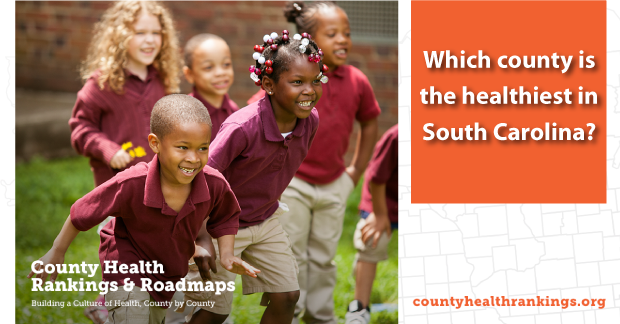
New Rankings Show Healthiest and Least Healthy Counties in South Carolina
 Beaufort County ranks healthiest in South Carolina and Marlboro County is the least healthy county in the state, according to the ninth annual County Health Rankings, released today by the Robert Wood Johnson Foundation (RWJF) and the University of Wisconsin Population Health Institute (UWPHI). The Rankings are available at www.countyhealthrankings.org.
Beaufort County ranks healthiest in South Carolina and Marlboro County is the least healthy county in the state, according to the ninth annual County Health Rankings, released today by the Robert Wood Johnson Foundation (RWJF) and the University of Wisconsin Population Health Institute (UWPHI). The Rankings are available at www.countyhealthrankings.org.
An easy-to-use snapshot that compares counties within states, the Rankings show that where you live influences how well and how long you live. The local-level data make it clear that good health is influenced by many factors beyond medical care including housing, education, and jobs. This year’s new Rankings State Reports show meaningful gaps in health persist not only by place, but also by race and ethnicity. Looking at differences by place and race offers a more complete picture of health. This year’s analyses show that lack of opportunity, such as education, jobs, and affordable housing, disproportionately affects people of color across the nation and within South Carolina.
The new Rankings State Reports call attention to key drivers of health such as children in poverty.
Poverty limits opportunity and increases the chance of poor health. Children in poverty are less likely to have access to well-resourced and quality schools, and have fewer chances to be prepared for living wage jobs. The South Carolina State Report reveals that in South Carolina, 23 percent of children live in poverty, compared to the U.S. rate of 20 percent. Among racial and ethnic groups in South Carolina, rates of children in poverty range from 14 percent to 38 percent with Hispanic children faring the worst and White children faring the best.
“The County Health Rankings illustrate that the health effects of all policies at the state and local level must be addressed,” said Kester Freeman, executive director of the South Carolina Institute of Medicine and Public Health. “It is only by addressing the important drivers of health, including poverty and other gaps in opportunities as shown in this year’s report, that we can improve the health of all who live in South Carolina. The Rankings are an important tool to spark and inform these discussions.”
Our children will become more resilient, and grow into stronger, healthier adults with greater economic opportunities if we build communities with quality education, emotional and social support, access to quality health care, and safe, affordable, and stable housing.
“We can’t be a healthy, thriving nation if we continue to leave entire communities and populations behind,” said Richard Besser, MD, RWJF president and CEO. “Every community should use their County Health Rankings data, work together, and find solutions so that all babies, kids, and adults – regardless of their race or ethnicity – have the same opportunities to be healthy.”
According to the 2018 Rankings, the five healthiest counties in South Carolina, starting with most healthy, are Beaufort County, followed by York County, Charleston County, Greenville County, and Lexington County. The five counties in the poorest health, starting with least healthy, are Marlboro County, Marion County, Dillon County, Allendale County, and Williamsburg County.
“The time is now to address long-standing challenges like child poverty,” said Julie Willems Van Dijk, PhD, RN, director of County Health Rankings & Roadmaps. “This year’s Rankings are a call to action to see how these persistent health gaps play out locally, take an honest look at their root causes, and work together to give everyone a fair shot at a healthier life.”
The South Carolina County Health Rankings & Roadmaps team collaborate on several efforts highlighting the Rankings. The Rankings are informing the Alliance for a Healthier South Carolina’s Population Health Summit, which will bring together community-based multi-sector health improvement coalitions for a collaborative learning experience through video conferencing in June 2018, and the South Carolina Institute of Medicine and Public Health’s Workforce for Health Taskforce to produce recommendations for a workforce focused on prevention, community settings and the social-environmental determinants of health.
For more than 40 years the Robert Wood Johnson Foundation has worked to improve health and health care. We are working with others to build a national Culture of Health enabling everyone in America to live longer, healthier lives. For more information, visit www.rwjf.org. Follow the Foundation on Twitter at www.rwjf.org/twitter or on Facebook at www.rwjf.org/facebook.
The University of Wisconsin Population Health Institute advances health and well-being for all by developing and evaluating interventions and promoting evidence-based approaches to policy and practice at the local, state, and national levels. The Institute works across the full spectrum of factors that contribute to health. A focal point for health and health care dialogue within the University of Wisconsin-Madison and beyond, and a convener of stakeholders, the Institute promotes an exchange of expertise between those in academia and those in the policy and practice arena. The Institute leads the work on the County Health Rankings & Roadmaps and the RWJF Culture of Health Prize. For more information, visit http://uwphi.pophealth.wisc.edu.
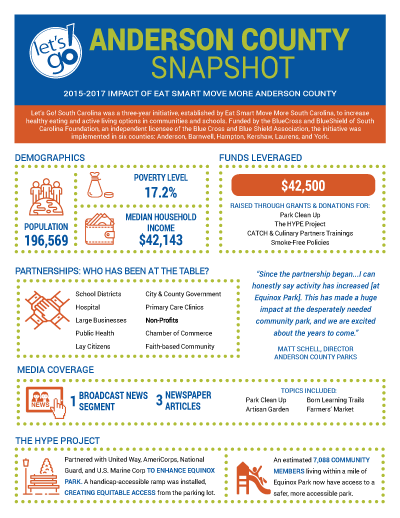
Let’s Go! South Carolina Community Snapshots
 |
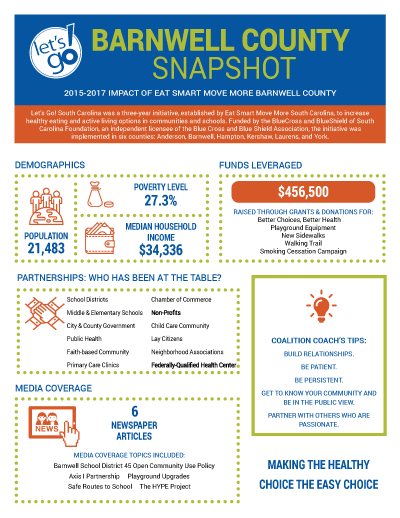 |
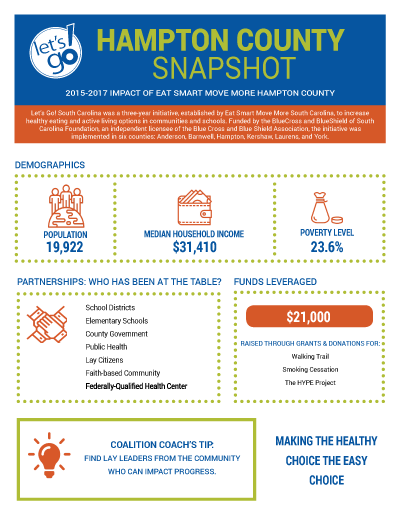 |
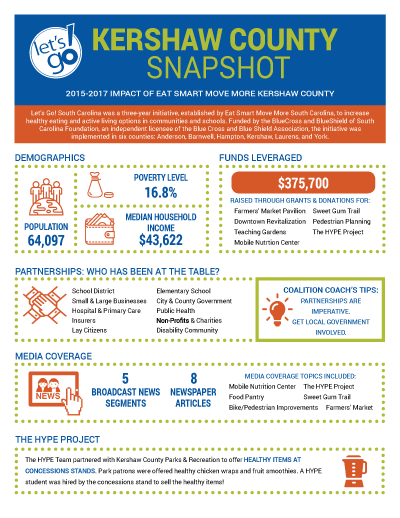 |
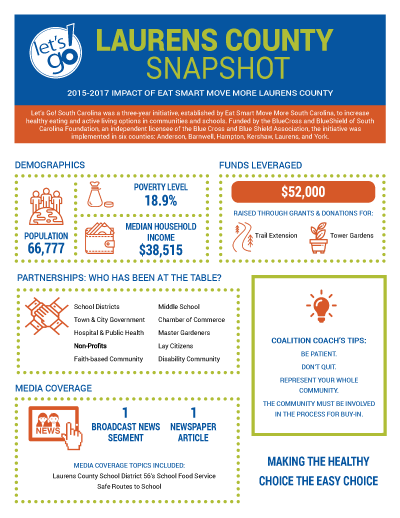 |
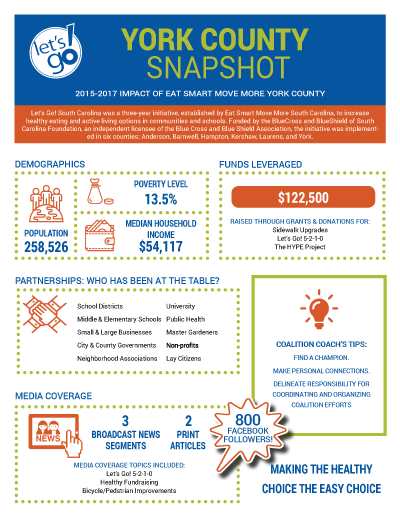 |

Let’s Go! SC Initiative Shows Positive Results
 Over the past three years, six communities participated in the Let’s Go! South Carolina initiative, implementing strategies across multiple sectors to increase access to healthy foods and physical activity. Coalition members from each of the six communities – Anderson, Barnwell, Hampton, Kershaw, Laurens, and York counties – gathered recently to learn about their impact and to celebrate a job well done.
Over the past three years, six communities participated in the Let’s Go! South Carolina initiative, implementing strategies across multiple sectors to increase access to healthy foods and physical activity. Coalition members from each of the six communities – Anderson, Barnwell, Hampton, Kershaw, Laurens, and York counties – gathered recently to learn about their impact and to celebrate a job well done.
“We are so proud of the impact the Let’s Go! SC project has had over the past three years,” said Beth Franco, executive director of Eat Smart Move More South Carolina. “It wouldn’t have been possible without the dedication and leadership from these six coalitions.”
The Let’s Go! SC evaluation team spent a rigorous amount of time collecting data on the community projects to determine impact. The six communities had an impressive collective impact:
- $1.3 million leveraged through grants, donations, and matched funds
- 36,327 students have access to healthier school environments due to partnerships with Alliance for a Healthier Generation
- 24,736 SNAP recipients in three counties now have access to fresh produce at farmers’ markets
- 43,985 people live within a mile of a park or path enhanced by a coalition
- 17 parks, playgrounds, and trails were improved
- 75+ youth were trained through the HYPE project
 Evaluators also determined individual community impacts, which can be found here.
Evaluators also determined individual community impacts, which can be found here.
“Community work can be hard,” said Hannah Walters, senior project manager at ESMMSC. “Change always takes longer than we want or expect. But, the Let’s Go project has shown us just how rewarding and impactful incremental changes can be in a community. Whether it’s bringing a new partner to the table or getting a new trail installed in your community, we know that success comes in all shapes and sizes.”
The Let’s Go! South Carolina Initiative was funded by the BlueCross BlueShield of South Carolina Foundation, an independent licensee of the Blue Cross and Blue Shield Association.
VIDEO: Columbia’s Vending Food Service Policy
ESMMSC Elects New Board Chairman and Three New Board Members
 Eat Smart, Move More South Carolina announced the election of the new board of directors chairman and three new members. New Board Chairman Jen Wright succeeds Erika Kirby, whose term as chairman ended in 2017 but continues to serve as a board member.
Eat Smart, Move More South Carolina announced the election of the new board of directors chairman and three new members. New Board Chairman Jen Wright succeeds Erika Kirby, whose term as chairman ended in 2017 but continues to serve as a board member.
Also elected to the ESMMSC board was Dudley Brown, public relations coordinator at Greenville Hospital System; Denna Hilton, chief operation officer at HopeHealth in Florence; and Dr. Peter Schriver, a surgeon at AnMed Health Cannon in Pickens. The three new members replace Dr. Janice Key, Angela Lorenz, and Dr. Laura Long, whose terms ended in 2017.
“We are thrilled to have Jen Wright serve as Board Chairman and to welcome our new board members, whose wealth of experience and expertise will help position ESMMSC for further growth and success,” said ESMMSC Executive Director Beth Franco. “All of our board members are highly respected in their fields and have great influence on healthy eating and active living in their communities, as well as at the state level. Our dynamic board will continue to ensure ESMMSC remains an influential and impactful organization in the health of South Carolina.”
Jen Wright is the Working Well ditector at the SC Hospital Association. She assists hospitals, businesses, and their wellness teams in creating a healthy work environment by implementing healthy changes supportive of tobacco-free living while providing healthy food and physical activity opportunities during the workday. She has a bachelor’s degree from Truman State University and a masters degree in public health.
Dudley Brown has worked in marketing and public relations with two of the Upstate’s largest health systems. Brown is also a former newspaper reporter, who wrote about health care and nonprofits. Besides serving on the Eat Smart Move More South Carolina board, he serves on the board for Girls on the Run Spartanburg. Brown has a bachelor’s degree in mass communication from Winthrop University.
Deena Hilton is chief operating officer at HopeHealth in Florence and brings expertise in the areas of non-profit management, program management, and community health management. Deena is married and has a six-year-old son. Her hobbies include reading, boating, playing basketball and tennis, and running.
Dr. Peter Schriver is a practicing general surgeon in Pickens, and has played an active role in the development and promotions of the Doodle Trail. He received his medical degree from Medical University of South Carolina College of Medicine and has been in practice for more than 20 years. Dr. Schriver enjoys running and spending time with family and friends.
To view the full board of directors, click here.
